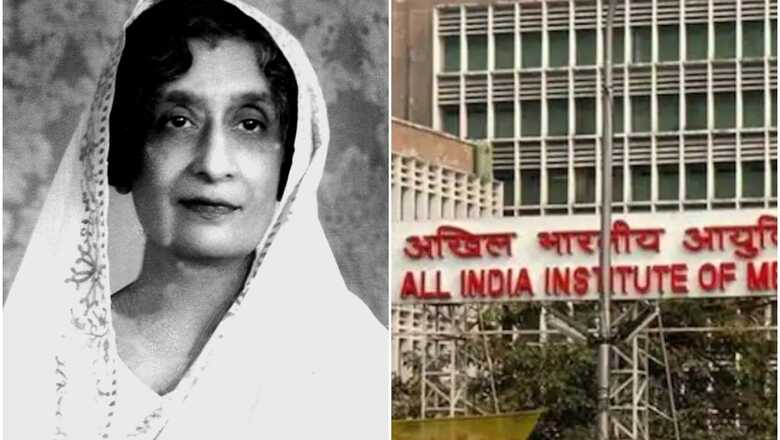
views
All India Institute of Medical Sciences (AIIMS) has been a beacon of hope for many, especially since the coronavirus pandemic. But while Jawaharlal Nehru is usually credited with its creation, not many know the story of the woman who was primarily responsible for the creation of India's apex medical body.
Rajkumari Amrit Kaur was the princess of Kapurthala, Lucknow. She was also India's first health minister under the Nehru government, the first Asian woman to head a WHO governing body and the woman behind the foundation of AIIMS.
But why does nobody talk about her? This is what a doctor and social worker pointed out on Twitter in a recent tweet.
Dr Sonali Vaid was responding to a photo tweeted by another Twitter user Dr Srinivas whose Twitter bio read that he was the General Secretary at AIIMS. In the tweet, Dr Srinivas had shared an image of Nehru with his team of ministers and architects, looking at am model of AIIMS before it was built.
May 21, 1959,The Director of the All India Institute of Medical Sciences in New Delhi explaining to Jawaharlal Nehru the model of the AIIMS. The AIIMS was a product of Nehru’s vision of India as a pioneer in the field of medical science and related research.#AIIMS #Nehru pic.twitter.com/VqaJX92kng— Srinivas M.D(AIIMS)???? (@srinivasaiims) August 3, 2020
But Dr Vaid pointed out that while the photo and the post depicted Nehru at the helm of the creation, it was actually Amrit Kaur, then health minister, who was the visionary behind AIIMS.
"AIIMS was HER vision and she laid the foundations #womeninleadership #history Amrit Kaur India's first health minister and a woman of many other firsts," Vaid wrote.
But who was Rajkumari Amrit Kaur?
A graduate from Oxford, Kaur had been educated in England since infancy. But as the Indian freedom struggle grew, the princess soon became a freedom fighter under the tutelage of Gopal Krishna Gokhale, later transitioning into a social reformer.
She started the All India Servants Party to serve the underprivileged. By 1926, Kaur had formed the All India Women's Conference to champion the rights of women and make their presence as a political force felt.
Kaur went to play a lead role in increasing women's participation in the nationalist movement and also played the role of a secretary to Mahatma Gandhi until India formed its first government and Nehru offered her the health ministry.
AIIMS and more
While Kaur has many accolades, the brightest feather in her cap must be AIIMS, which has for years provided access to medical facilities without discriminating against the rich and the poor. And Kaur was the key visionary behind the body.
In 1957, Kaur managed to secure funding from several countries including Australia, New Zealand, Sweden, the United States, and West Germany to for the creation of AIIMS. Her time as the President of the World Health Assembly, the governing body of the World Health Organisation in 1950 helped her better negotiate the aid.
It was also under the aegis and initiative of Kaur that AIIMS remained an autonomous body that could serve as the nucleus of India's healthcare research and resources.
The fact that entry into AIIMS is based on competitive exams is also a gift from Kaur who wanted students and doctors to be inducted into the premier body on the basis of merit and nothing else.
But despite her achievements, Nehru is usually the only person credited with the creation of AIIMS. And while the first Prime Minister of India did put an impetus on healthcare and scientific research as well as made the key decision of handing over the health ministry portfolio to Kaur, it was Kaur who was at the wheel when it came to the creation of AIIMS.
The creation of AIIMS may have been proposed by Nehru who initially wanted to set it up in Calcutta, but Kaur's contributions cannot be undone.
But women and doctors like Vaid have taken it upon themselves to remind the world about real heroes, especially women, whose lives are and contributions are often forgotten by the pages of history.
I am seeing tweets going around how Nehru was responsible for AIIMS. No he wasn't. Amrit Kaur, a woman made it happen. And there is another fancy video of historical Indians - with only one woman!Let's not whitewash history to exclude women. https://t.co/hY16j7oI0p— Dr. Sonali Vaid MD MPH (@SonaliVaid) August 3, 2020
"I am seeing tweets going around how Nehru was responsible for AIIMS. No he wasn't. Amrit Kaur, a woman made it happen. And there is another fancy video of historical Indians - with only one woman! Let's not whitewash history to exclude women," an agitated Vaid tweeted," Vaid wrote.




















Comments
0 comment